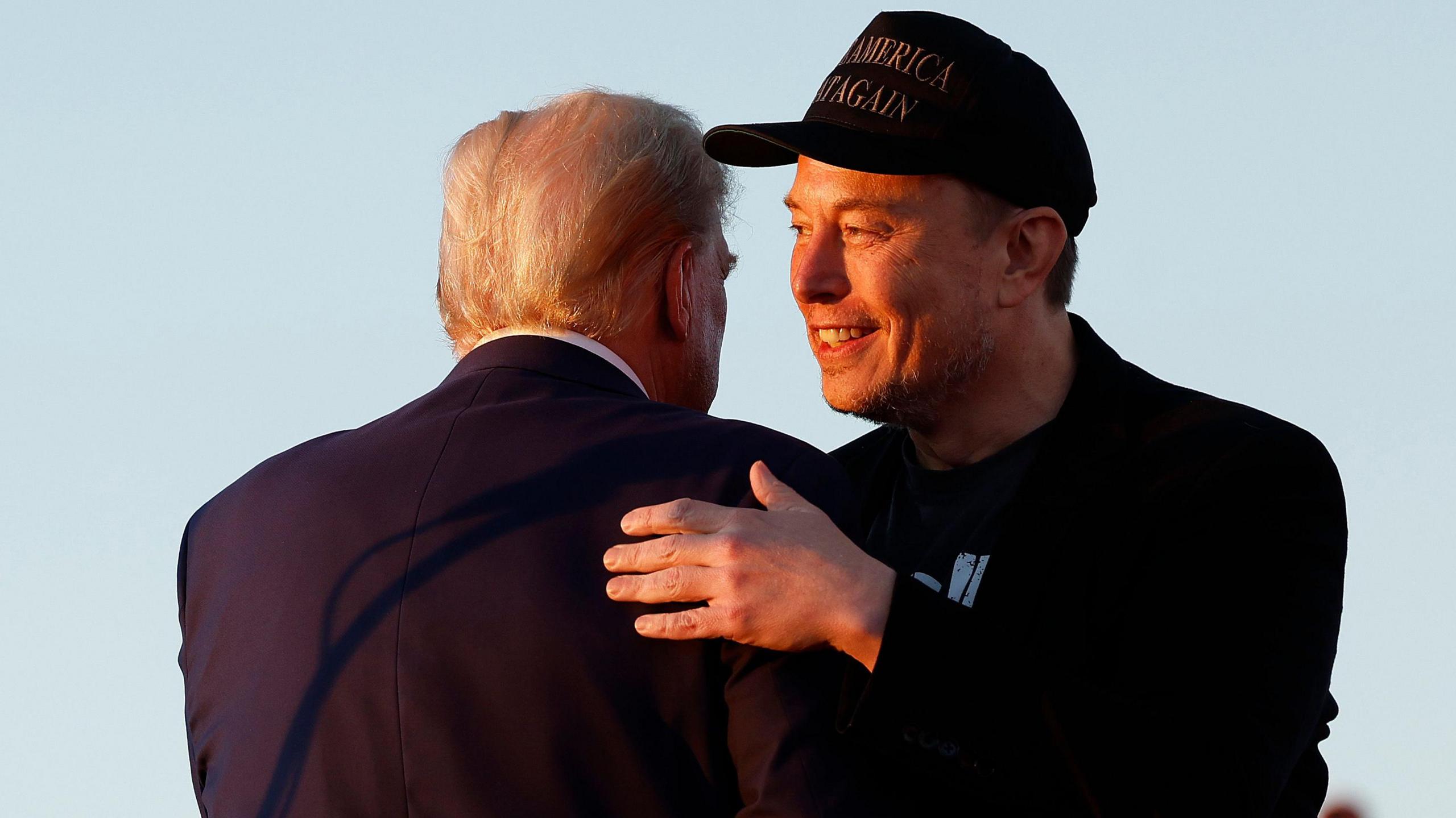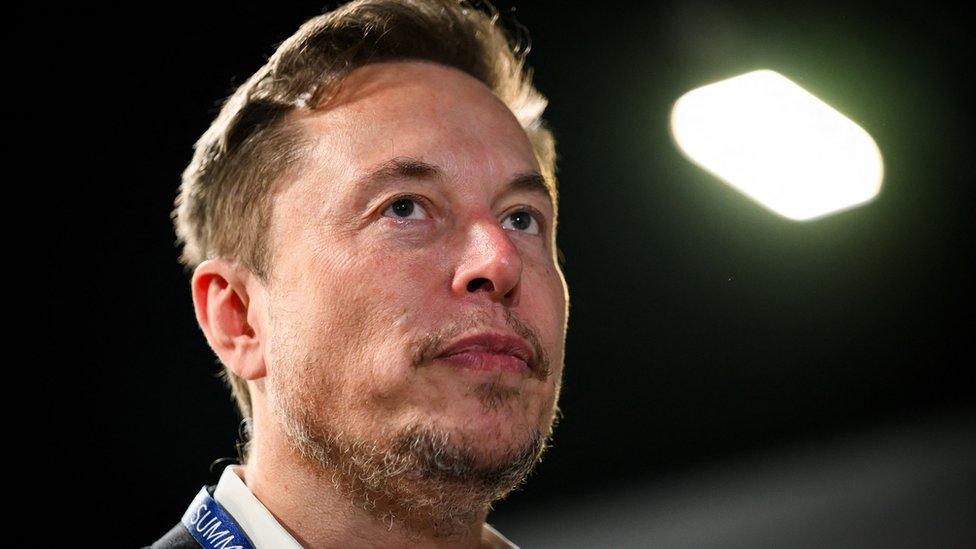Why is Elon Musk becoming Donald Trump's efficiency tsar?
Watch: Donald Trump and Elon Musk on the campaign trail
- Published
Billionaire Elon Musk has been tasked with leading incoming President Donald Trump's new Department of Government Efficiency (Doge).
In a statement on social media, the US president-elect said Musk - along with former Republican presidential candidate Vivek Ramaswamy - would "dismantle government bureaucracy, slash excess regulations, cut wasteful expenditures, and restructure federal agencies".
It is a role that the tech entrepreneur has arguably prepared for through his business leadership, and one he has spent months pushing for.
But it is also one that is expected to garner him influence over government policy - and the regulatory environment facing his enterprises.
Musk told a Trump rally in October that he believed the US government's budget could be cut by "at least" $2tn from about $6.5tn. He has also frequently suggested the number of government employees could be significantly reduced.
Ramaswamy, meanwhile, has put forward plans to scrap a number of federal departments including the Department of Education, the Nuclear Regulatory Commission, the Internal Revenue Service and the FBI.
Railing against regulation
Musk has cast his plans to optimise government efficiency in heroic terms, pointing to his hopes of one day colonising Mars, while arguing that the feat would only be possible "so long as it is not smothered by bureaucracy".
At the time, he said creating the new Doge was "the only path to extending life beyond Earth".
Any major cuts to government agencies could also have potentially significant implications for his business interests, which are closely entwined with the government.
Rocket firm SpaceX alone has more than $8bn-worth of ongoing contracts with the US government, according to public contracting sites, and could stand to benefit further from closer government ties.
Meanwhile, his electric car company Tesla is facing investigations from numerous government agencies over issues such as the safety of its self-driving features. His desire to cut regulation could affect such probes.
In recent years, Musk has repeatedly accused regulators of launching trivial probes and standing in the way of his companies.
In September he threatened to sue the Federal Aviation Administration over its plans to fine his SpaceX company $633,000 for alleged licence infringements related to some of its rocket launches from Cape Canaveral in Florida. He accused the agency of "regulatory overreach".
Musk "stands to benefit personally from a lot of the deregulation that he touts," says Christopher Phelps, a professor of modern US political history, adding: "I think putting someone who is a billionaire and runs major corporations in charge of a federal project of deregulation is innately full of conflicts of interest."
Others said Musk, who has long described himself as having a libertarian bent, appeared to be a true believer in the benefits of smaller government.
"There’s no doubt that Musk has significant vested interests in the US regulatory landscape as a result of his many business enterprises," says Thomas Gift, a political science professor and director of the Centre on US Politics at University College London.
"At the same time, it’s hard to make the case that this is the only impetus driving him.
"Musk has undertaken huge personal and political risks in coming out for Trump, and many of his activities and rhetoric seem to reflect an individual ideologically committed to causes he believes in."
"Clearly he has got skin in the game and there’s a self-interest, but equally you can have a sincere belief that there is too much government regulation and too much government bureaucracy," says Alex Waddan, a professor of US politics at the University of Leicester.
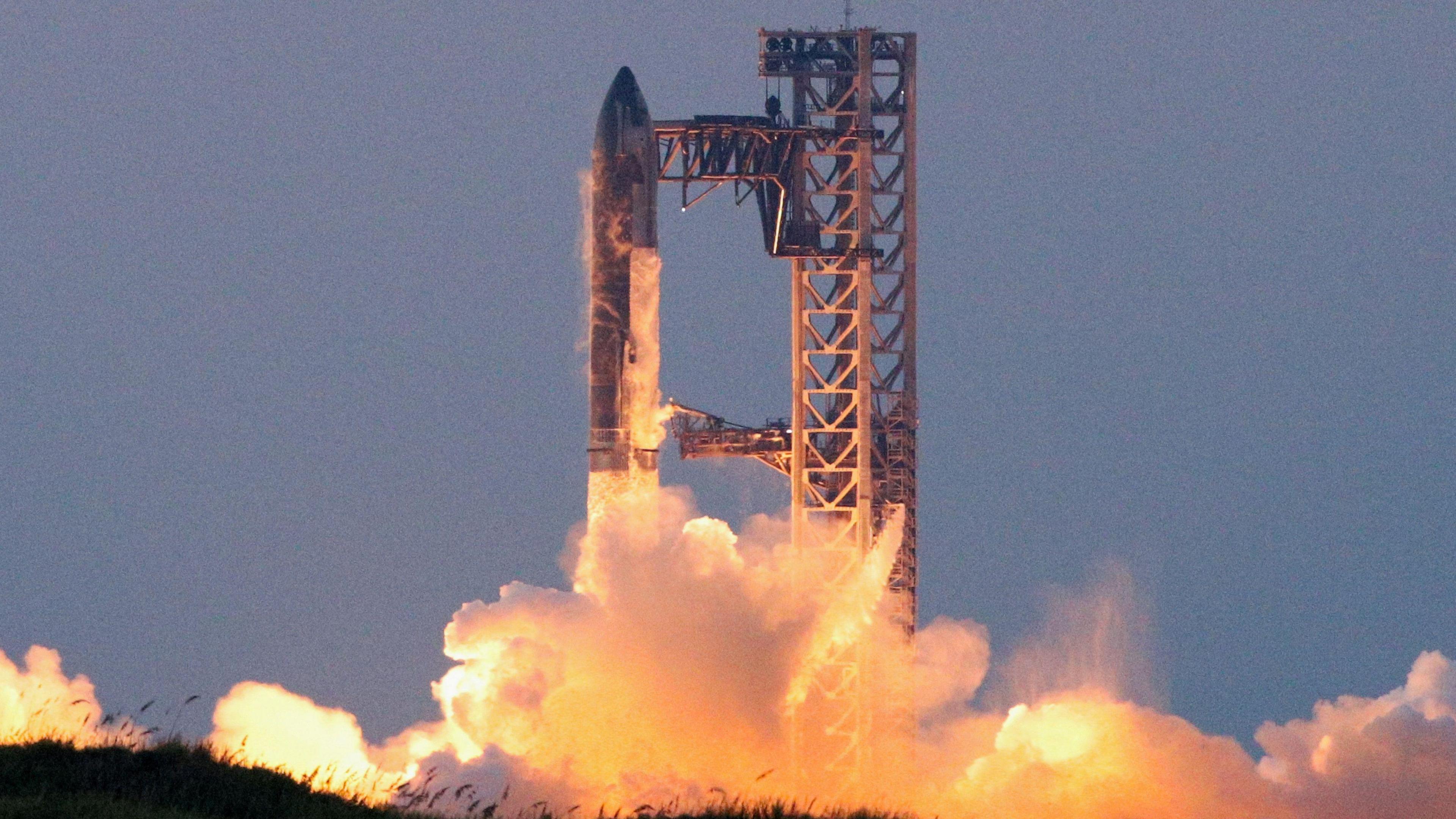
Elon Musk says cutting red tape is "the only path" to colonsing other planets
Reward for loyalty
For years, Musk did not play a big role in politics, despite his large fortune, now worth more than $300bn, according to Forbes estimates.
But he spoke out against the pandemic lockdowns of 2020. His criticism of the Biden administration mounted after the White House did not invite Tesla to an electric car summit in 2021.
He formally endorsed Trump this year after an assassination attempt, ultimately donating more than $100m (£79m) to Trump's 2024 presidential campaign and appearing at numerous rallies.
Prof Phelps describes Musk's relationship with Trump as "transactional", adding that the new role "gives him a lot of symbolic clout - and possibly the clout to get the things that matter most to him done".
As the South African-born billionaire is not a US citizen by birth, Musk cannot become president - something that has frustrated other famous faces who became involved in politics in the past.
But he can have an influence on US policy, and Trump will have a sympathetic adviser to call upon.
"Trump is looking to surround himself with loyalists in his new administration, and there’s no-one who’s been more loyal than Musk since he announced his endorsement for Trump," says Prof Gift.
"Not only did Musk go 'all in' in supporting Trump personally and financially during the campaign, but he’s also evolved into a trusted adviser on topics as diverse as technology policy to the war in Ukraine."
In an early sign of the influence the tech entrepreneur may be rewarded with for his loyalty, Musk was party to a call between Trump and Ukrainian President Volodymyr Zelensky following the election. The war in Ukraine will be a major foreign policy concern when Trump takes office.
"That is actually quite extraordinary," says Prof Waddan. "Normally, even your biggest donors wouldn’t get that kind of access."
What is the Department of Government Efficiency?
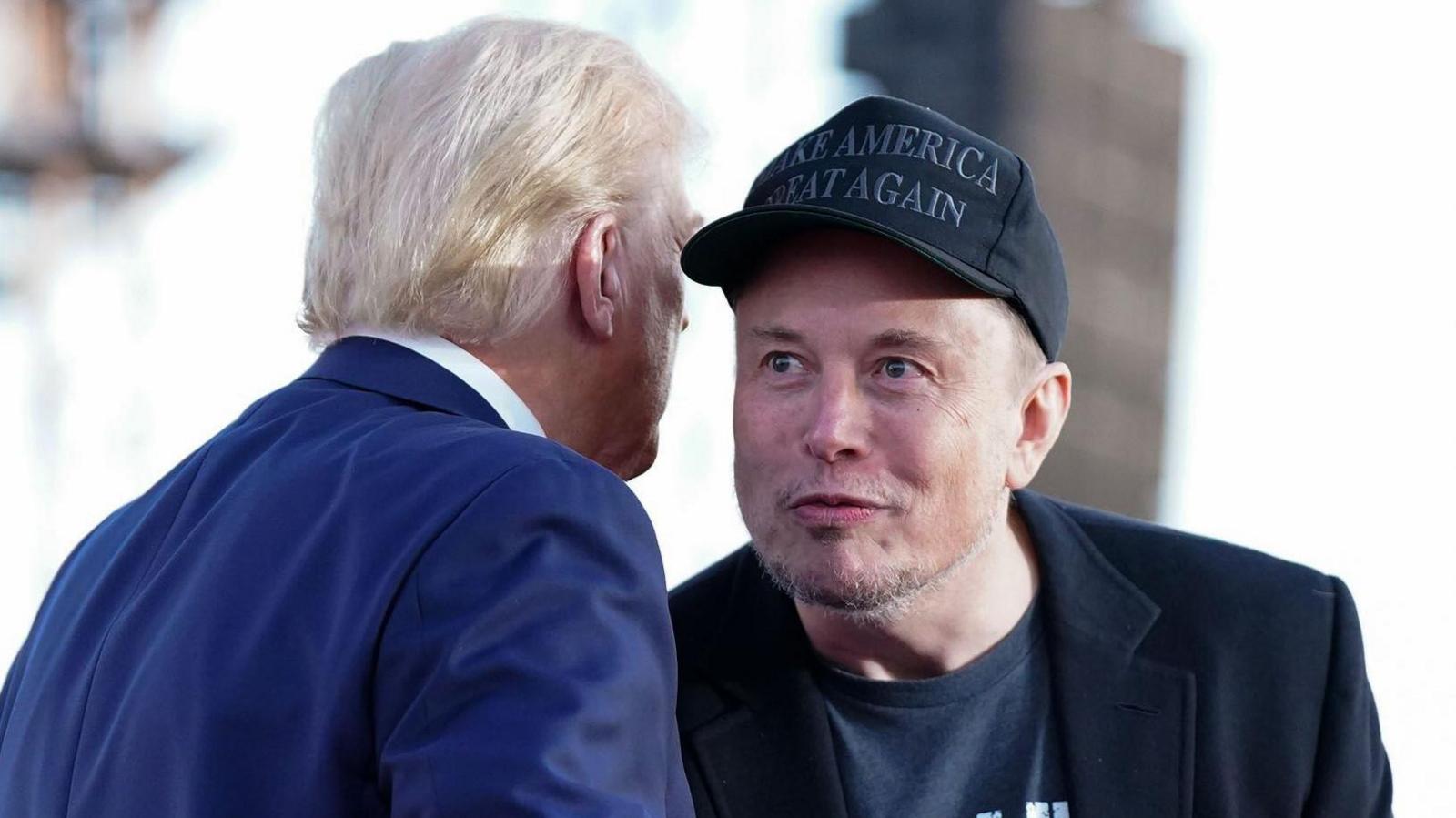
Musk first raised the idea of a cost-cutting effort while hosting Trump on X this summer. The official name is a winking reference to a meme featuring a Shiba Inu dog, which then gave its name to the cryptocurrency Dogecoin, a favourite of Musk that has seen its value soar since the election.
Prof Phelps says the name is "a nod to crypto deregulation being part of what they’ll do".
But it is not clear how much of Musk's talk of cutting might actually become reality.
For one thing, the new department will not have an official role, but provide "advice and guidance from outside government", according to the announcement.
Experts have also warned that cuts of the scale discussed could be enormously disruptive - and face pushback in Congress - depending on how rapidly they are implemented.
Musk himself acknowledged the risks, saying Americans should be ready to stomach temporary hardship for long-run gain.
The way he has run his own firms may hint at what Americans can expect.
After his October 2022 takeover of the social media platform Twitter - which he branded as X - Musk introduced radical changes, including the reduction X's workforce from around 8,000 to 1,500 in a matter of weeks.
"His idea of efficiency was to let a lot of people go," says Alex Waddan, a professor of US politics at the University of Leicester.
Musk also loosened content moderation, stopped verifying accounts and welcomed users back to the platform who had been banned for violating its rules on hate speech and disinformation.
Among the users he reinstated was Trump, who had been banned following the Capitol riot in January 2021 after continuing to claim the 2020 election had been rigged against him.
Critics argue his changes have given prominence to hate-speech and misinformation - though Musk maintains the site is politically neutral.
The overhaul also prompted an exodus of advertisers - the main way the site has made money. Though Musk has introduced new ways to raise revenue, such as paid subscriptions, the company today is worth far less than the $44bn Musk paid for it just two years ago.
His record at his other big companies - Tesla and SpaceX - is stronger.
Among car companies, Tesla stands out for making electric vehicles at a large profit, thanks in part to streamlined operations. His rocket firm SpaceX is credited with enabling rocket launches at significantly lower cost.
"As a serial entrepreneur, Musk has been relentless in trying to improve institutional efficiency at his own enterprises," Prof Gift says.
He adds that though Musk's primary role will be "slashing through the thicket of red tape that is the US federal government", his position will also give him influence in the new administration.
"While his role in the Department of Government Efficiency will be a more informal one, there’s no doubt that he’s got Trump's ear - at least for the moment."
Related topics
- Published7 November 2024
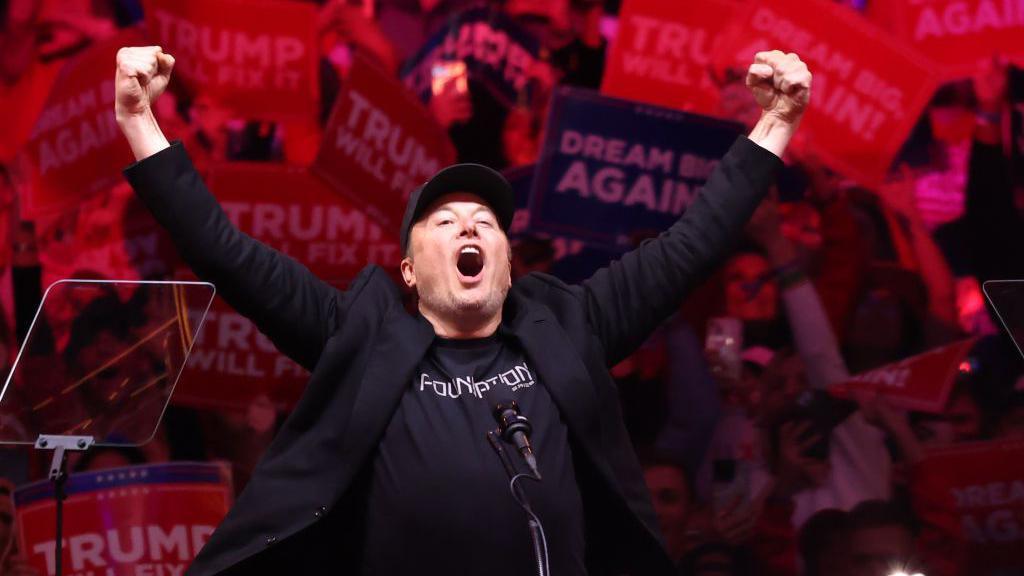
- Published13 November 2024
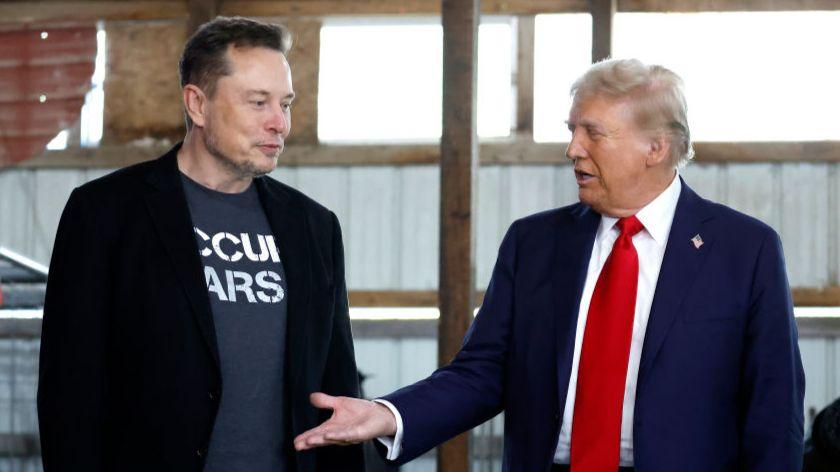
- Published22 October 2024
